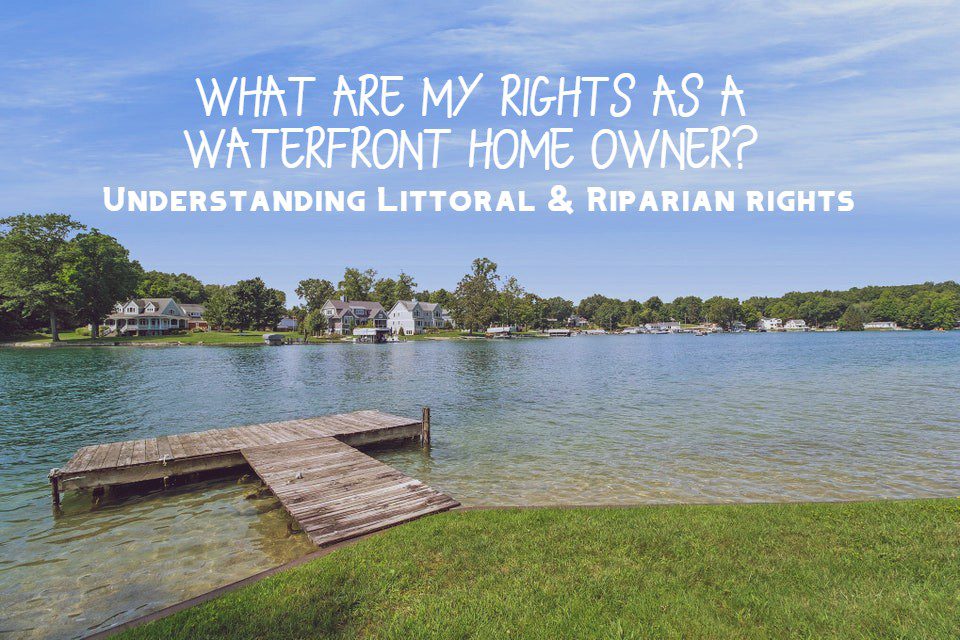What are my rights as a waterfront home owner? Understanding Littoral & Riparian rights

Michigan has a lot of water – over 3,200 miles of Great Lakes coastline, more than 10,000 inland lakes and ponds, interconnected by miles of freshwater rivers, streams, and wetlands.
With that much water, Michigan water law, known as littoral & riparian law, has been developed to regulate, divide, and protect the waters of our State. At their core, they give Michigan landowners a legal right to use the surface waters immediately adjacent to their property.
Littoral and riparian rights are legal concepts that pertain to the rights and privileges associated with owning or using land adjacent to bodies of water, such as lakes and rivers. Littoral land includes or abuts a lake. Land is riparian when it includes or is bounded by a natural watercourse.
If you own a home by a lake or river, you should know these rights, which allow you to use and enjoy the water in certain ways. These rights usually include things like swimming, boating, and fishing, as well as the right to erect and maintain docks along the owner’s shore and the right to anchor boats permanently off the owner’s shore. However, the specific rights can vary based on local laws and regulations. It’s important to know what you’re allowed to do on the water and what might be restricted to make sure you’re using the water responsibly and within the law.
These concepts vary based on the type of water body and the jurisdiction’s legal framework. Here’s an overview of the differences between littoral and riparian rights:
Littoral Rights:
- Applicable Water Bodies: Littoral rights pertain to landowners whose property is adjacent to large, navigable bodies of water, typically oceans and large lakes.
- Rights and Usage: Littoral rights primarily focus on the use and enjoyment of the water itself. Landowners with littoral rights generally have the right to access and use the water for recreational purposes and to construct structures like docks and piers, subject to regulations.
- Ownership Boundary: The boundary between littoral land and the water is generally defined as the high-water mark or the mean high-water line. This means that the landowner’s property extends up to this point.This has been a point of contention between homeowners and beach walkers over the years on beaches of the Great Lakes. On July 29, 2005, the Michigan Supreme court ruled that the general public has the right to walk along the shores of the Great Lakes on land below the ordinary high water mark. The court based its decision on the language of the public trust doctrine and found that walking along the lakeshore is a traditionally protected public right.
- Water Rights: Littoral landowners typically do not have the same rights to the flowing water as riparian landowners. Instead, their rights are centered around the use of the water’s surface.
Riparian Rights:
- Applicable Water Bodies: Riparian rights apply to landowners whose property is located along the banks of rivers, streams, and smaller water bodies.
- Rights and Usage: Riparian rights focus on both the use of the water and the land. Landowners with riparian rights have the right to use the water for domestic purposes (like drinking and irrigation) as well as to access the water for recreational activities.
- Ownership Boundary: The boundary between riparian land and the water is generally defined as the ordinary high-water mark. This mark signifies the point where vegetation changes and is influenced by the water’s regular fluctuations.
- Water Rights: Riparian landowners have more extensive rights to the flowing water compared to littoral landowners. These rights are often subject to the principle of reasonable use, ensuring that one landowner’s water use doesn’t unreasonably harm other riparian owners.
When you break it down to the basics, the main difference between littoral and riparian rights lies in the type of water body they apply to, the extent of rights to use the water and land, and the boundaries that define ownership. It’s important to note that the specifics of these rights can vary depending on the jurisdiction’s laws and regulations, as well as the unique circumstances of each case. Be sure to ask your lake home realtor for more details on the rights of a lake home you’re considering purchasing.








I agree. The rights to use an abutting lake can also be impacted upon the prior owner(s)’ agreements. Sometimes, in Michigan, land under a lake could be deeded to a third-party — including a property owners’ association. As such, some rights (such a right to erect a dock or anchor a boat) could be affected.
So if you live on Lake Huron anyone can walk the beach if they have legal access or permission to enter thru private ownership. But do those same people have the right to remove stones and/or boulders that are in-land from the water❓❓❓❓
Hi Kathleen, no, no one should not be removing items that are in-land from the high water mark.